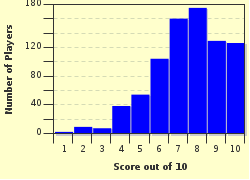Quiz Answer Key and Fun Facts
1. Every 5th November Britain celebrates this man's failure to blow up Parliament in 1605. Who is he?
2. Which musician was also known for a time as "The Thin White Duke"?
3. What did William Wilberforce (1759-1833) campaign against for many years?
4. Emmeline Pankhurst (1858-1928) is best remembered for being a vociferous campaigner for which cause?
5. William Tyndale was executed in 1536. What was his crime?
6. What is the title of Professor Stephen Hawking's best known book?
7. When Queen Elizabeth II was born in 1926, where did she stand in the line of succession to the throne?
8. Who was the last native Welshman to hold the title "Prince of Wales"?
9. The unit of electrical capacitance is named after which of these people?
10. Alan Turing (1912-1954) made significant contributions in the field of computer science and cryptology. However, his career effectively came to an end in 1952 after what event?
Source: Author
Supersal1
This quiz was reviewed by FunTrivia editor
bloomsby before going online.
Any errors found in FunTrivia content are routinely corrected through our feedback system.

